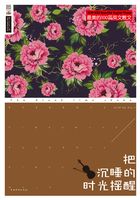
第2章 生如夏花(2)
We walked down the path to the well-house, attracted by the fragrance of the honeysuckle with which it was covered. Some one was drawing water and my teacher placed my hand under the spout. As the cool stream gushed over one hand she spelled into the other the word water, first slowly, then rapidly. I stood still, my whole attention fixed upon the motions of her fingers. Suddenly I felt a misty consciousness as of something forgotten — a thrill of returning thought: and somehow the mystery of language was revealed to me. I knew then that “w-a-t-e-r” meant the wonderful cool something that was flowing over my hand. That living word awakened my soul, gave it light, hope, joy, set it free! There were barriers still, it is true, but barriers that could in time be swept away.
两条道路
The Two Roads
约翰·罗斯金 / John Ruskin
新年之夜,一位上了年纪的人伫立在窗前。他抬起充满哀伤的眼睛,仰望着深蓝色的天空,星星在那里游移着,如同朵朵百合散落在清澈而平静的湖面上。接着,他把目光投向地面,看到几个比他更加绝望的人正走向他们的终点——坟墓。在通往人生终点的道路上,他已经走过了六十个驿站,除了过失和悔恨之外,他一无所获。现在,他健康欠佳,精神空虚,心情忧郁,缺少晚年应有的舒适和安逸。
年轻的时光如梦幻般浮现在他眼前,他回想起父亲将他放在人生道路的入口处时那个关键的时刻。当时,摆在他面前的有两条道路:一条通向和平宁静、阳光灿烂的地方,那里充满花果,回荡着柔和甜美的歌声;另一条则通向黑暗无底的深渊,那里流淌着毒汁而非清水,恶魔肆虐,毒蛇横行。
他仰望着天空,痛苦地叫喊:“啊,青春,请回来吧!啊,父亲,请把我重新放到人生道路的起点上吧,我将会作出更好的选择。”然而,父亲和他的青春都已离他远去。
他看着灯光被黑暗吞没,那就是他虚度的时光;他看见一颗星星从空中陨落、消逝,那正是他自身的写照,悔恨如同利箭深深刺进他的心脏。然后,他回想起儿时的朋友,他们曾与他一同踏上人生的旅程,现在已走在成功的道路上,受到人们的尊敬,此时正沉浸在欢度新年的幸福中。
教堂高塔上的钟声敲响了,这让他回忆起父母早年对他的爱,他们曾给予他谆谆教诲,曾为他的幸福向上帝祈祷。但他偏偏选择了人生的歧途。羞愧和忧伤使他再也不敢正视他父亲所在的天堂。他双眼无神,饱含着泪水,在绝望中,他奋力高喊:“回来吧,我那逝去的岁月!回来吧!”
他的青春真的回来了,因为上面所发生的一切只不过是他在新年所做的一场梦。他依然年轻,当然他也曾真的犯过错误,但还不至于堕入黑暗深渊,他仍然可以自由地走在通向宁静和光明的道路上。
正在人生路口徘徊,正在犹豫是否要选择光明大道的年轻人啊,你们一定要记住:当你青春已逝,在黑暗的群山中举步维艰、跌跌撞撞的时候,你才会痛心疾首、徒劳无功地呼喊:“啊,回来吧,青春!啊,把我美好的年华还给我吧!”
It was New Year’s Night. An aged man was standing at a window. He raised his mournful eyes towards the deep blue sky, where the stars were floating like white lilies on the surface of a clear calm lake. Then he cast them on the earth, where few more hopeless people than himself now moved towards their certain goal—the tomb. He had already passed sixty of the stages leading to it, and he had brought from his journey nothing but errors and remorse. Now his health was poor, his mind vacant, his heart sorrowful, and his old age short of comforts.
The days of his youth appeared like dreams before him, and he recalled the serious moment when his father placed him at the entrance of the two roads—he leading to a peaceful, sunny place, covered with flowers, fruits and resounding with soft, sweet songs; the other leading to a deep, dark cave, which was endless, where poison flowed instead of water and where devils and poisonous snakes hissed and crawled.
He looked towards the sky and cried painfully, “O, youth, return! O, my father, place me once more at the entrance to life, and I’ll choose the better way!” But both his father and the days of his youth had passed away.
He saw the lights flowing away in the darkness. These were the days of his wasted life; he saw a star fall from the sky and disappeared, and this was the symbol of himself. His remorse, which was like a sharp arrow, struck deeply into his heart. Then he remembered his friends in his childhood, who entered on life together with him. But they had made their way to success and were now honoured and happy on this New Year’ s Night.
The clock in the high church tower struck and the sound made him remember his parents’ early love for him. They had taught him and prayed to God for his good. But he chose the wrong way. With shame and grief he dared no longer look towards that heaven where his father lived. His darkened eyes were full of tears, and with a despairing effort, he burst out a cry, “Come back, my early days! Come back!”
And his youth did return, for all this was only a dream, which he had on New Year’s Night. He was still young though his faults were real; he had not yet entered the deep, dark cave, and he was still free to walk on the road which leads to the peaceful and sunny land.
Those who still linger on the entrance of life, hesitating to choose the bright road, remember that when years are passed and your feet stumble on the dark mountains, you will cry bitterly, but in vain: “O youth, return! O give me back my early days!”
快乐吧!
Be Happy!
劳埃德·莫里斯 / Lloyd Morris
第一次读到英国桂冠诗人梅斯菲尔德这行诗的时候,我非常惊讶,它真正的寓意是什么呢?不仔细考虑的话,我一直认为这句诗倒过来才对。不过他的冷静与自信却俘获了我,所以我一直无法忘记这句诗。
终于,我好像领会了他的意思,意识到其中蕴涵着深刻的观察思考。快乐带来的智慧存在于清晰的心灵感觉中,不因忧虑、担心而困惑,不因绝望、厌烦而迟钝,不因惶恐而出现盲点。
跳动的快乐——不仅是满足或惬意——会突然到来,就像四月的春雨或是花蕾的绽放,然后你发觉智慧已随快乐而来。草儿更绿,鸟儿的歌声更加美妙,朋友的缺点也变得更加可以理解、原谅。快乐就像一副眼镜,可以修正你精神的视力。
快乐的视野并不受你周围事物的局限。只不过当你不快乐的时候,思想便转向你感情上的苦恼,眼界也就被心灵之墙隔断了。而当你快乐的时候,这道墙便崩塌了。
你的眼界更宽了。脚下的大地,身旁的世界——人们、思想、情感、压力——现在都溶进了一个更加宏伟的情境中,每件事都恰如其分。这就是智慧的开端。
When I first read this line by England’s Poet Laureate, it startled me. What did Masefield mean? Without thinking about it much, I had always assumed that the opposite was true. But his sober assurance was arresting. I could not forget it.
Finally, I seemed to grasp his meaning and realized that here was a profound observation. The wisdom that happiness makes possible lies in clear perception, not fogged by anxiety nor dimmed by despair and boredom, and without the blind spots caused by fear.
Active happiness—not mere satisfaction or contentment—often comes suddenly, like an April shower or the unfolding of a bud. Then you discover what kind of wisdom has accompanied it. The grass is greener, bird songs are sweeter, the shortcomings of your friends are more understandable and more forgivable. Happiness is like a pair of eyeglasses correcting your spiritual vision.
Nor are the insights of happiness limited to what is near around you. Unhappy, with your thoughts turned in upon your emotional woes, your vision is cut short as though by a wall. Happy, the wall crumbles.
The long vista is there for the seeing. The ground at your feet, the world about you—people, thoughts, emotions, pressures—are now fitted into the larger scene. Everything assumes a fairer proportion. And here is the beginning of wisdom.
爱是艰难的
Love Is Difficult
勒内·马利亚·里尔克 / Rainer Maria Rilke